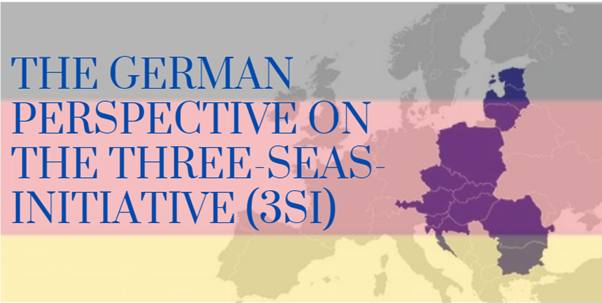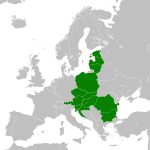OPINIONS
Date: 26 October 2022 Author: Katja-Elisabeth Herrmann Eufracio
Since its inception in 2015, the Three Seas Initiative (3SI or TSI) has gradually flourished in the Trimarium countries, gathering more and more support from private entities and becoming the focus of research centers. Countries such as Poland, Croatia and the Czech Republic continuously supported the Initiative, which consequently led to its gradual development.

The main objectives of strengthening cooperation, especially in the fields of infrastructure, energy and security, are driven by two basic narratives. First, members between the Baltic Sea and the Adriatic still feel threatened by territorial proximity and energy dependence on Russia. Secondly, there is no doubt that the policy in Brussels has largely determined the political and economic course of the countries of Central and Eastern Europe. The countries of the Three Seas Initiative make up roughly a third of the EU’s total land area and population, yet they account for only about 10% of the bloc’s GDP. In this spirit, there is great interest in strengthening the region’s economic strength. In addition, the implementation of infrastructural projects along the north-south axis.
Germany is not an official member of the Three Seas Initiative, but interest in the initiative has grown since its implementation in 2016. to the European Union and competitive with Germany. There is no doubt that Berlin viewed the project with disinterest and conflicting distrust rooted in two fears. First, the growing US interest in the region and continued economic support. In addition, US criticism of Nord Stream 2 and German defense spending below the 2% NATO target has deepened concerns. This criticism combined two aspects of German foreign policy.
Let us recall that when US President Donald Trump attended the second meeting of the Three Seas Initiative in Warsaw, he openly spoke out against Germany regarding Nord Stream 2. As a consequence, Germany feared that TSI would become a tool of US influence in the eastern part of the EU. All in all, it is to be used to increase its economic presence by importing gas from the USA. Currently, there is no doubt that not only Germany and the US are observing the potential in the region, but also countries such as China have supported private investment in Central and Eastern Europe. Indeed, such considerations have been closely watched in the context of the US-China trade war and its impact on the TSI region.
Despite this, the official statement ensures that the initiative is meant to be complementary, not competing with the EU. That is why Germany attended the TSI 2018 Summit in Bucharest for the first time. Gradually, “in the eyes of Germany, TSI took on a new dimension as the US became interested in it, especially after President Donald Trump’s participation in the Warsaw Summit in 2017.”
As a committed partner in the initiative, Germany should continue its sympathetic involvement as it is a key trading partner for most TSI countries (except Lithuania, Latvia and Estonia). Thus, “the participation of Germany, the largest EU member state, further strengthens the initiative.” According to former German foreign minister Heiko Maas, “Germany is ready to increase its involvement in the Three Seas Initiative – for example by supporting projects in the field of renewable energy.” Having said that, it cannot be overlooked that TSI has now developed a geo-strategic element highlighted by German and US experts. As one of the main pillars of the Initiative, energy security became a recurring topic of discussion during the 2022 Russian invasion of Ukraine. In fact, the war changed the energy landscape across Europe. Today, energy policy is seen as a means of supporting cohesion in the EU. In this context, there seems to have been a change in the German TSI assessment after the official withdrawal of the Nord Stream 2 gas pipeline.
Accordingly, German foreign policy will now become more open to political dialogue with the 12-country members of 3SI. From an economic point of view, German investments and presence are to be targeted at two main areas within the 3SI investment fund, namely energy and digitalisation. Therefore, Germany intends to become a geoeconomic actor in the region. However, this scenario will still encounter resistance from Poland, as Germany’s economic power is almost twice that of the 12 participating countries. Still, the Three Seas Initiative is certainly an opportunity for Germany to re-establish itself as a supporter of smaller EU member states and an advocate for a stronger EU.
Sources:
1. Carafano James Jay, “The untapped potential of the Three Seas Initiative” Geopolitical Intelligence Services AG (August 10, 2022) Available at < https://www.gisreportsonline.com/r/three-seas-initiative-2/ >
2. Fritz Philipp, “A Nudge in the Right Direction Tackling the Diverging Interests in the Three Seas Initiative” Visegrad Insight (January 15, 2021) Available at: < https://visegradinsight.eu/nudge-in-the-right-direction- three-seas-initiative/ >
3. Dahl Martin, “Evolution of Germany’s Stance Regarding the Three Seas Initiative”, Yearbook of the Institute of Central and Eastern Europe 17 (2019), issue 3, pp. 65-77, DOI:10.36874/RIESW.2019.3.4. Available at < https://ies.lublin.pl/wp-content/uploads/2020/08/riesw_2019-3-04.pdf >
4. Hasselbach Christoph and Rosalia Romaniec, “Berlin takes a new approach to the Three Seas Initiative” Die Deutsche Welle (June 5, 2019) Available at < https://www.dw.com/en/berlin-takes-a-new- approach-to-the-three-seas-initiative/a-49076663 >
5. Lang Kai-Olaf, “Die Drei-Meere-Initiative: wirtschaftliche Zusammenarbeit in geostrategischem Kontext Deutschland sollte sein Engagement auch aus außenpolitischen Gründen verstärken” Stiftung Wissenshaft und Politik (SWP) (February 16, 2021) Available at: < https://www.swp-berlin.org/en/publication/die-drei-meere-initiative-wirtschaftliche-zusammenarbeit-in-geostrategischem-kontext >
6. Three Seas Initiative, “The Three Seas Initiative Story” (Updated 2022) Available at: < https://3seas.eu/about/threeseasstory >
7. Three Seas Initiative, “President of Germany: the initiative has huge potential to create synergies and thus provide important added value to the region” Available at: < https://3seas.eu/media/news/president-of-germany-the-initiative-has-huge-potential-to-create-synergies-and-thus-provide-important-added-value-to-the-region?lang=en >
8. Żornaczuk Tomasz, “Germany and the Three Seas Initiative” Polish Institute of Foreign Affairs (PISM) (August 22, 2019) Available at: < https://pism.pl/publications/Germany_and_the_Three_Seas_Initiative >
Financed by the National Institute of Freedom – Civil Society Development Center as part of the Government Program Civic Initiatives Fund NEWFIO for the years 2021-2030.
Support Us
If content prepared by Warsaw Institute team is useful for you, please support our actions. Donations from private persons are necessary for the continuation of our mission.
_________________________________
All texts published by the Warsaw Institute Foundation may be disseminated on the condition that their origin is credited. Images may not be used without permission.

















